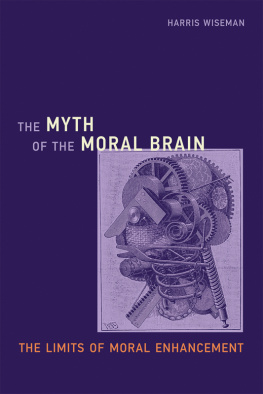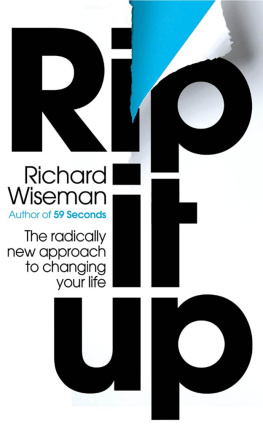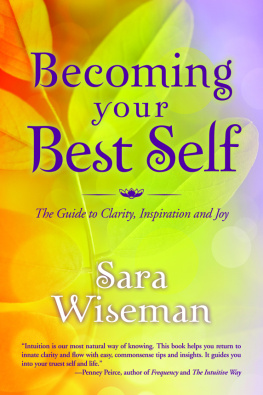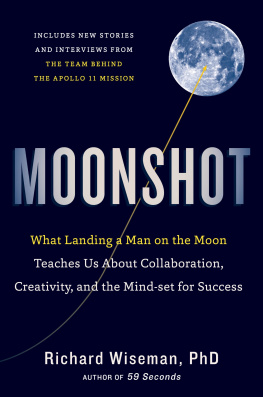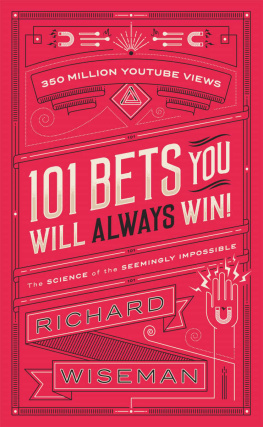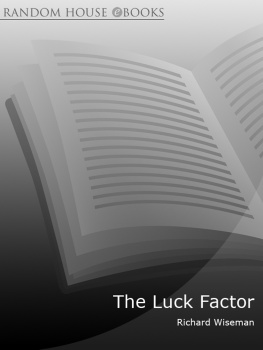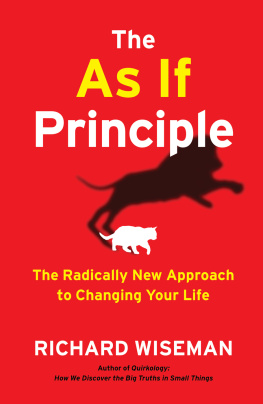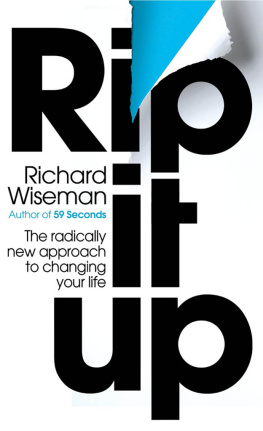ALSO BY RICHARD WISEMAN Quirkology Did You Spot the Gorilla? The Luck Factor Laughlab

To Jeff
CONTENTS
Self-help exposed, Sophies question, and the potential for rapid change
Why positive thinking often fails and how the real route to happiness involves a pencil, keeping the perfect diary, small acts of kindness, and developing the gratitude attitude
Why rewards fail, how to give the flawless interview, improve your social life by making mistakes, never lose your wallet again, and convince anyone of anything by using your pet frog
The dark side of visualization, how to achieve absolutely anything by creating the ideal plan, overcoming procrastination, and employing doublethink
Exploding the myth of brainstorming, how to get in touch with your inner Leonardo merely by glancing at modern art, lying down, and putting a plant on your desk
Why you shouldnt play hard to get, how the subtle art of seduction involves the simplest of touches, roller-coaster rides, and avoiding artificial Christmas trees
The perils of active listening, why Velcro can help couples stick together, words speak louder than actions, and a single photograph can make all the difference
Why not to kick and scream, how to reduce resentment in seconds, harness the power of a four-legged friend, and think your way to low blood pressure
Why two heads are no better than one, how never to regret a decision again, protect yourself against hidden persuaders, and tell when someone is lying to you
The Mozart myth, how to choose the best name for a baby, instantly divine a childs destiny using just three marsh-mallows, and effectively praise young minds
Why not to trust graphology, how to gain an apparently magical insight into other peoples personality from their fingers and thumbs, their pets, and the time they go to bed
Sophies answer: Ten techniques in 59 seconds
introduction
Self-help exposed ,
Sophies question , and the
potential for rapid change
DO YOU WANT TO IMPROVE an important aspect of your life? Perhaps lose weight, find your perfect partner, obtain your dream job, or simply be happier? Try this simple exercise.
Close your eyes and imagine the new you. Think how great you would look in those close-fitting designer jeans, dating Brad Pitt or Angelina Jolie, sitting in a luxurious leather chair at the top of the corporate ladder, or sipping a pia colada as the warm waves of the Caribbean gently lap at your feet.
The good news is that this type of exercise has been recommended by some in the self-help industry for years. The bad news is that a large body of research now suggests that such exercises are, at best, ineffective and, at worst, harmful. Although imagining your perfect self may make you feel better, engaging in such mental escapism can also have the unfortunate side effect of leaving you unprepared for the difficulties that crop up on the rocky road to success, thus increasing the chances of your faltering at the first hurdle rather than persisting in the face of failure. Fantasizing about heaven on earth may put a smile on your face, but it is unlikely to help transform your dreams into reality.
Other research suggests that the same goes for many popular techniques that claim to improve your life. Attempting to think yourself happy by suppressing negative thoughts can make you obsess on the very thing that makes you unhappy. Group brainstorming can produce fewer and less original ideas than individuals working alone. Punching a pillow and screaming out loud can increase, rather than decrease, your anger and stress levels.
Then there is the infamous Yale Goal Study. According to some writers, in 1953 a team of researchers interviewed Yales graduating seniors, asking them whether they had written down the specific goals that they wanted to achieve in life. Twenty years later the researchers tracked down the same cohort and found that the 3 percent of people who had specific goals all those years before had accumulated more personal wealth than the other 97 percent of their classmates combined. It is a great story, frequently cited in self-help books and seminars to illustrate the power of goal setting. There is just one small problemas far as anyone can tell, the experiment never actually took place. In 2007 writer Lawrence Tabak, from the magazine Fast Company , attempted to track down the study, contacting several writers who had cited it, the secretary of the Yale Class of 1953, and other researchers who had tried to discover whether the study had actually happened. No one could produce any evidence that it had ever been conducted, causing Tabak to conclude that it was almost certainly nothing more than an urban myth. For years, self-help gurus had been happy to describe a study without checking their facts.
Both the public and the business world have bought into modern-day mind myths for years and, in so doing, may have significantly decreased the likelihood of achieving their aims and ambitions. Worse still, such failure often encourages people to believe that they cannot control their lives. This is especially unfortunate, as even the smallest loss of perceived control can have a dramatic effect on peoples confidence, happiness, and life span. In one classic study conducted by Ellen Langer at Harvard University, half of the residents in a nursing home were given a houseplant and asked to look after it, while the other residents were given an identical plant but told that the staff would take responsibility for it. Six months later, the residents who had been robbed of even this small amount of control over their lives were significantly less happy, healthy, and active than the others. Even more distressing, 30 percent of the residents who had not looked after their plant had died, compared to 15 percent of those who had been allowed to exercise such control. Similar results have been found in many areas, including education, career, health, relationships, and dieting. The message is clearthose who do not feel in control of their lives are less successful, and less psychologically and physically healthy, than those who do feel in control.
A few years ago I was having lunch with a friend named Sophie. Sophie is a bright, successful thirtysomething who holds a senior position in a firm of management consultants. Over lunch Sophie explained that she had recently bought a well-known book on increasing happiness, and she asked me what I thought of the industry. I explained that I had serious reservations about the scientific backing for some of the techniques being promoted, and described how any failure to change could do considerable psychological harm. Sophie looked concerned and then asked whether academic psychology had produced more scientifically supported ways of improving peoples lives. I started to describe some of the quite complex academic work in happiness, and after about fifteen minutes or so Sophie stopped me. She politely explained that interesting though it was, she was a busy person, and she asked whether I could come up with some effective advice that didnt take quite so much time to implement. I asked how long I had. Sophie glanced at her watch, smiled, and replied, About a minute?
Sophies comment made me stop and think. Many people are attracted to self-development and self-improvement because of the lure of quick and easy solutions to various issues in their lives. Unfortunately, most academic psychology either fails to address these issues or presents far more time-consuming and complex answers (thus the scene in Woody Allens film Sleeper , in which Allens character discovers that he has awakened two hundred years in the future, sighs, and explains that had he been in therapy all this time he would almost be cured). I wondered whether there were tips and techniques hidden away in academic journals that were empirically supported but quick to carry out.




